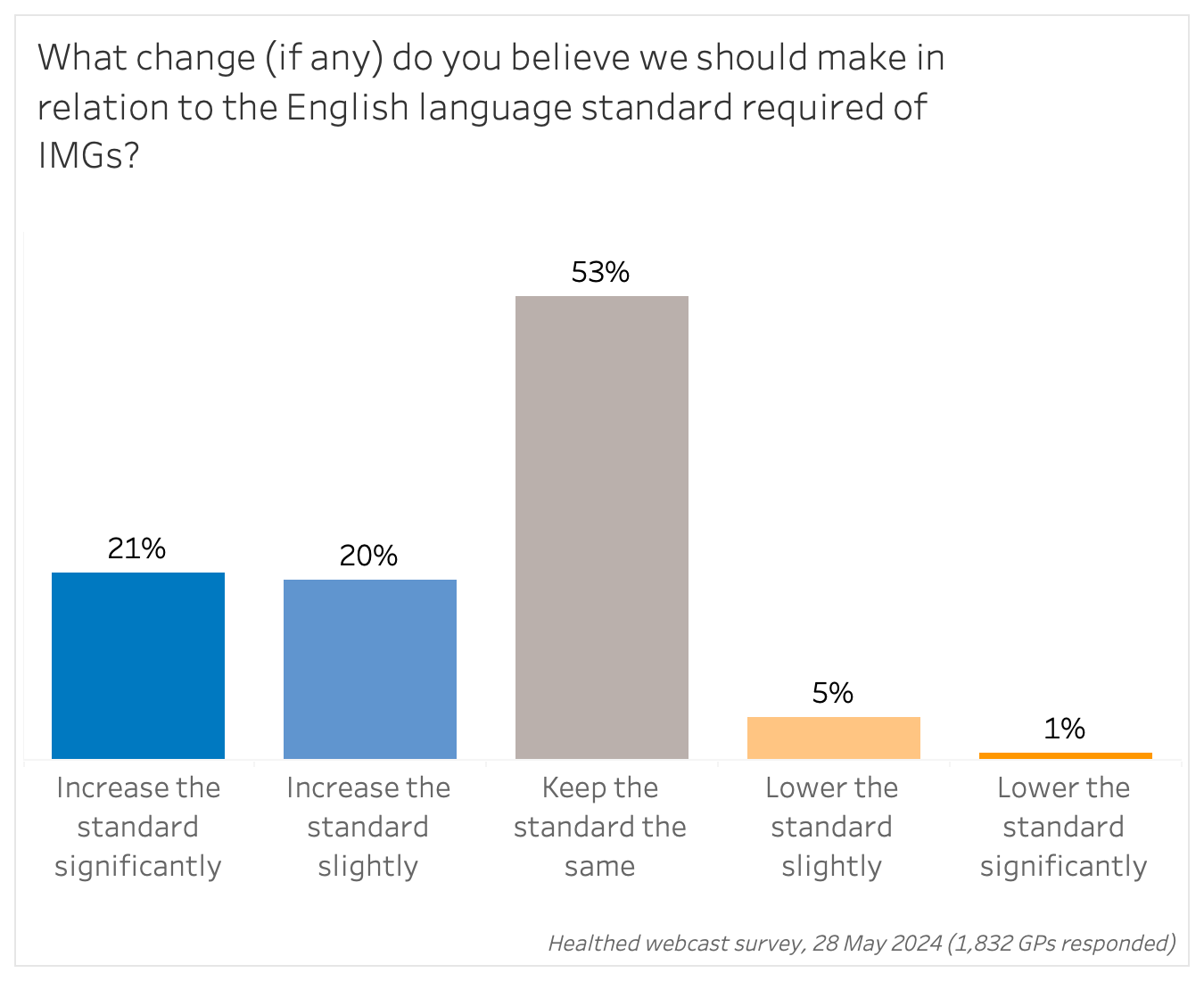Articles / Should the English language standard be eased for IMG entry?

Just 6% of more than 1800 GPs who responded to a national Healthed survey last fortnight agree that English language requirements should be eased— and perhaps more poignantly — 41% believe the standard should actually be increased.

Just over half of GPs want to keep the status quos.
The results stand in contrast with the recommendation put forward in the independent Kruk report, which has been listed as one of eight “priority recommendations.”
The Medical Board of Australia recently announced a fast-tracked process for internationally trained medical specialists – with GPs, anaesthetists, obstetrician and gynaecologists, and psychiatrists prioritised.
Recommendation 21 of the Kruk review says applicants should be provided with “greater flexibility in demonstrating their English language competency,” specifically by reducing the International English Language Testing System (IELTS) test standard for the written component from 7 to 6.5.
The report stresses that the minimum scores for reading, speaking and listening would stay the same— at 7— as would the minimum overall score. It also emphasises that the change in writing scores would align Australia with international practice.
Notably, the report states that this change would raise the success rate of test takers from 26% to 40%.
“Even native English speakers struggle to achieve a minimum of 7 on every IELTS band,” one GP commented to Healthed.
Reflecting the overall breakdown of GPs in Australia, roughly half of doctors in Healthed’s survey received their qualifications overseas.
GPs who completed their medical studies overseas were more likely than those with Australian qualifications to say we should keep the standard the same— 62% compared with 42%, respectively.
They were also less likely to say the requirements should be tightened – with 30% of international medical graduates saying the standard should be increased, compared with 54% of GPs who graduated in Australia.
Just 8% of GPs with qualifications from abroad and 2% of GPs with Australian qualifications supported lowering the standard.
Many GPs commented that patients often struggle to understand heavy accents – and several GPs said they themselves have difficulty with this.
Apart from accents, many GPs said lack of familiarity with colloquialisms and idioms posed a barrier for communication.
“The major difficulty patients have with IMGs is not their medicine, it is their English and ability to communicate,” one GP said.
“It is essential to have a good grasp of English if you want to be a GP in Australia. How else will you understand your patients and explain difficult concepts to them?” another GP said.
In their submission to the review last year, the RACGP recommended caution, noting that “high-level writing skills are essential for all medical professionals. The risks of adverse outcomes due to miscommunication in written records is significant.” Rather than lowering the standard, the College suggested supporting people to improve their writing skills.
The AMA also opposed the change, saying the current standard equates to an “operational command of the language,” allowing for occasional inaccuracies, inappropriate usage, and misunderstandings in some situations — which “should not be considered a high bar to pass.”
Likewise, ACRRM said it had “some concerns” about the proposal, noting the importance of patients and doctors in rural and remote communities being able to understand each other.
Still, apart from the obvious need for more fully trained doctors practising in Australia, there may be other benefits to a more diverse workforce.
“It’s pretty fundamental that doctors can communicate fluently in the main language in Australia, but IMGs with language skills in other languages commonly spoken in immigrant communities are very useful,” one GP said.

Menopausal Hormone Therapy - What Dose of Estrogen is Best?

Cardiovascular Benefits of GLP1s – New Evidence

Oral Contraceptive Pill in Teens

RSV and the Heart


Modified but kept in place
Eliminated entirely without replacement
Maintained as is
Completely replaced with an alternative system
Listen to expert interviews.
Click to open in a new tab
Browse the latest articles from Healthed.
Once you confirm you’ve read this article you can complete a Patient Case Review to earn 0.5 hours CPD in the Reviewing Performance (RP) category.
Select ‘Confirm & learn‘ when you have read this article in its entirety and you will be taken to begin your Patient Case Review.
Menopause and MHT
Multiple sclerosis vs antibody disease
Using SGLT2 to reduce cardiovascular death in T2D
Peripheral arterial disease
